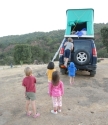 Yes, like just about everyone else these days, it seems, I’m on Facebook. Most of my Facebook “friends” are either family, parents of my kids’ friends, or fellow writers from the parenting world. It’s a good way to keep in touch and share ideas, news, and information with them. Sometimes, however, it becomes a source of revelation and insight as well. Such was the case last evening as I was catching up on the day’s posts at bedtime.
Yes, like just about everyone else these days, it seems, I’m on Facebook. Most of my Facebook “friends” are either family, parents of my kids’ friends, or fellow writers from the parenting world. It’s a good way to keep in touch and share ideas, news, and information with them. Sometimes, however, it becomes a source of revelation and insight as well. Such was the case last evening as I was catching up on the day’s posts at bedtime.
Scrolling down through the new photos dripping with cuteness, the desperate pleas for post-bedtime booze, and the occasional political or activist alert, I stumbled on a succinct review of the book It Happened on the Way to War by Rye Barcott. The wonderful and amazing Karen Walrond of Chookooloonks wrote that the book is “one of the best books I’ve read all year, no lie.” I read the blurb that went with the link she posted and thought that this was something important and significant.
It is a memoir of a college kid who, prior to joining the Marines, spent a summer living in a slum in Kenya so as to “better understand ethnic violence — something he would likely face in uniform.” The author, Rye Barcott, went on to found the non-profit group Carolina for Kibera (CFK) which works to “promote youth leadership and ethnic and gender cooperation in Kibera through sports, young women’s empowerment, and community development.” He continued working with CFK even while deployed with the Marines. It sounds like an inspiring tale of an amazing person.
And then I saw the next post. From one of the parenting websites I used to write for, the blurb asked “What’s your kid’s favorite after-school snack? Tell Us to Win a Prize…” It struck me that, had this followed any other post, I likely wouldn’t have given it a second thought. It was an entirely frivolous topic and, yet, there is was on my screen with exactly the same urgency, significance, and seriousness as Karen’s link to Barcott’s book. The problem is, the two are not equals.
The organization that Barcott founded works with children and families living in almost unimaginable poverty and sees providing access to education as part of their mission. The children they’re trying help may not have enough to eat at all, let alone the luxury of being picky about an afternoon snack. We here in America and, I suspect, other first-world countries, spend an inordinate amount of time worrying about our kids’ clothes, whether or not they’ll get the right teacher, and whether they should take violin, karate, or French lessons when, perhaps, what we ought to be doing is teaching our children to care about others.
I know that, sometimes, I forget how lucky we and our children really are; I’m not sure my kids know at all. Perhaps, however, it’s time to let them know and to figure out how we can make sure every child has nothing more serious to worry about than what snack they want after school.
Tags: africa, books, carolina for kibera, charity, food, kenya, poor, poverty, snacks

